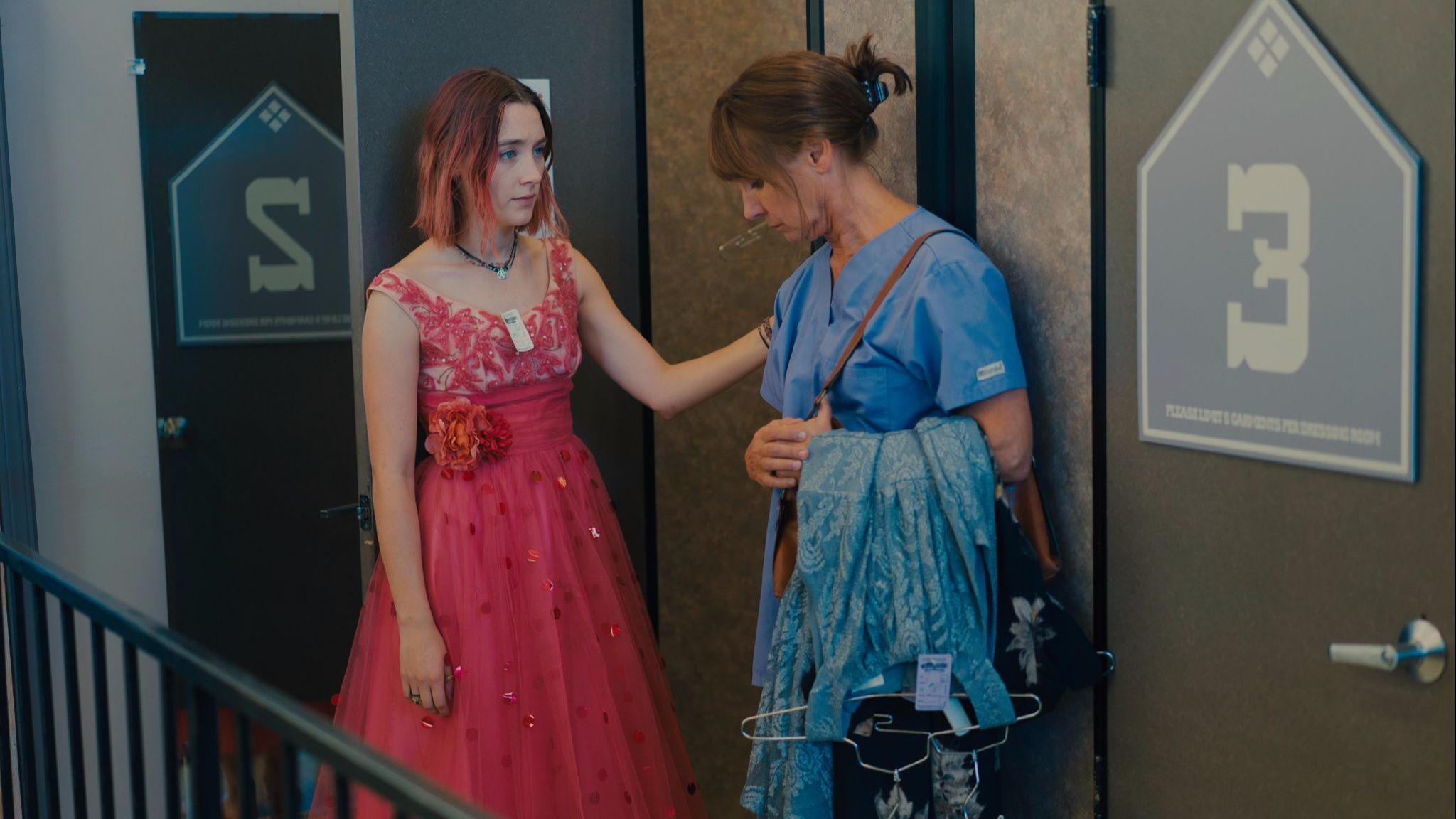35. Lady Bird, directed by Greta Gerwig
What If This Is The Best Version?
By Rose Marel
If you’re an Oscars enthusiast and enjoy gorging on the delectable feast of nominations, then I suggest that you dig into Lady Bird. It’s a perfect size and, while extremely satisfying to gobble up, it’s more richly layered than you might assume. And, in a welcome change, this film is 100 times better than the trailer would suggest.
Take Lady Bird‘s opening scene: hurling yourself out of a moving car is a fairly dramatic act of defiance, particularly when executed non-dramatically. But that’s Christina (Saoirse Ronan) for you, who goes by the moniker Lady Bird, which she now considers her given name (given by herself, anyway). She’s in her late teenage years – which is the potential pinnacle period of self-absorption – and Lady Bird observes as she enters her final year of school, and self-development, which can at times seem hindered by family.
Misunderstanding her parent’s sacrifice for her own misery, Lady Bird merely notes the superficial circumstances of her life without appreciating the entire situation. She sees a lackluster home, one that in no way compares to the mansions across town, but fails to sense her parent’s own hardworking paddle to keep this middle-class status afloat. Her constant complaints fly in the face of their own stagnated dreams, disturbing the cloud of humiliation that obscures all the hard work going on beneath it.
She doesn’t comprehend the significance of her father’s retrenchment or wonder about the degradation involved in attending job interviews in which he knows more about professional exchanges that the child interviewing him. She doesn’t realise that joking she comes from “the wrong side of the tracks” is an insult to those who put her there, or that refusing her birth name is just another dismissal of what she’s been given.
But that would be too harsh a summary of Lady Bird as a character. As narrow-sighted as she can be, Lady Bird is equally as impressive. She fearlessly pursues what she wants (boys and colleges that border on completely unrealistic), and sets the goals she needs to get there with a stubborn tenacity. She’s brave in ambitiously seeking to break the cycle of birth and death in Sacramento. She’s aiming higher and she’s gonna get out. She’s a truly strong character. It’s only when she finally channels it beyond her own self-absorption that she’s able to actually enrich her inner-self.

One of my all time favourite actresses – and one of the best of our generation – Saoirse Ronan is exceptional in this. She plays a role that is possibly the most dissimilar to herself thus far in her career (although as a disclaimer, while I hate to admit it, I don’t actually know her personally). It’s fair to say that Gerwig’s fabulous writing renders Lady Bird three-dimensional, but it’s Saoirse’s bold and committed portrayal that colours her in vivid hues.
In many ways, Gerwig’s fresh voice reminds me of Lena Dunham’s work. In both, there’s a focus on the minutiae of relationships and the character’s navigation through the messy confusion of life. Both writers draw from the complication of our life’s journey by including shaded reflections: characters become animated, the tone becomes both light and full of nuance, and simple plots become loaded with meaning. Like Dunham, there’s a rawness and relatability of every element to Gerwig’s work.
As a first-time writer and director, she’s also particularly successful in filtering a truthful reflection of interrelationships. One striking portrayal is the complex mother-daughter bond, composed of equal parts love and animalistic picking. Micro-arguments erupt from nothing, and conversations always flit between love and irritation, seen perfectly in the moment before the fateful car ejection. It’s an almost visceral connection, a motherly protection that mutates into a desperate desire for their offspring to reach their potential. It’s a difficult space to live within, and it begins to suffocate the pair’s relationship and Lady Bird’s self-discovery. This is a good place to acknowledge the brilliant performance of Laurie Metcalf, who plays Lady Bird’s mother Marion.

The complexity of adolescence really comes to the fore in Lady Bird. It seems everyone at school hungrily scrambles to disguise the buds of their real identity with the mass-produced blanket of whatever is supposedly most desirable from another’s perspective. A relentless assessment of what others deem ‘cool’ before pasting it over themselves – promiscuity or elusiveness or apathy. Lady Bird, an intrinsically quirky female, tries to abide by this mentality but being a rebel in a herd-like society proves to be a real conflict.
It’s like she’s unable to conform but still desperately wants to. It seems that denying your true spirit in pursuit of something discerned as greater isn’t as easy as dying your hair. Losing herself fully into her own innate identity also requires accepting her genetic input, as well as rejecting the tantalizing fluff of popular thought. Her personal growth is a slow blossoming that comes from accepting the ordinary gifts that the world and the people in it give to you.
In the same way that you can’t capture a rainbow in a net, I can’t adequately encapsulate this movie’s full delight. It’s rich, thought-provoking, nostalgia-inducing, fresh, entertaining, funny and… Oh for God’s sake, just go see it yourself.
One Reply to “35. Lady Bird, directed by Greta Gerwig”
Sounds like Ronan’s performance is a must see , ta for the tip off